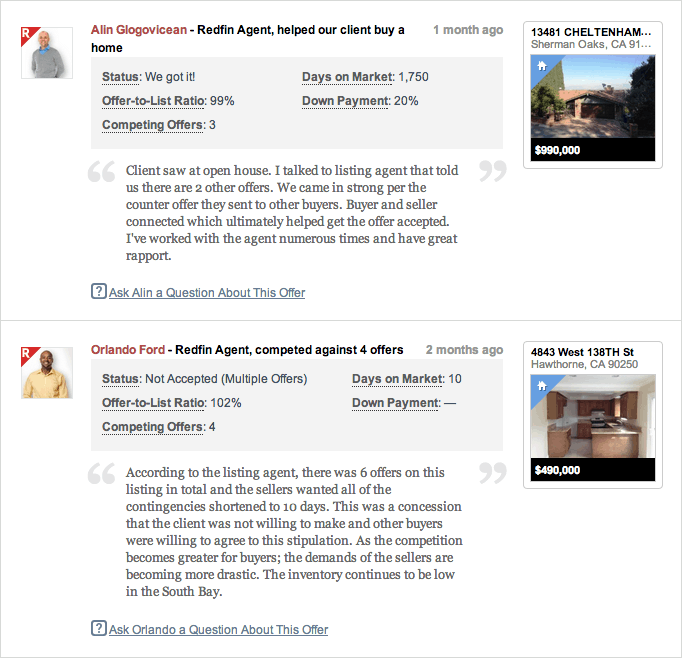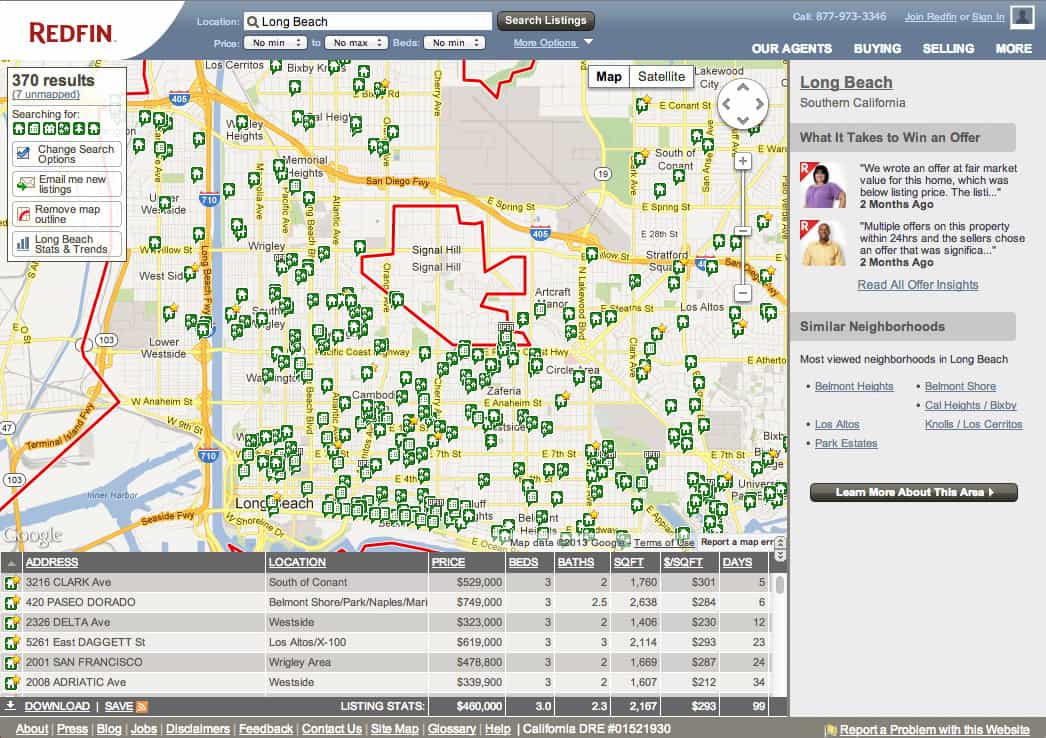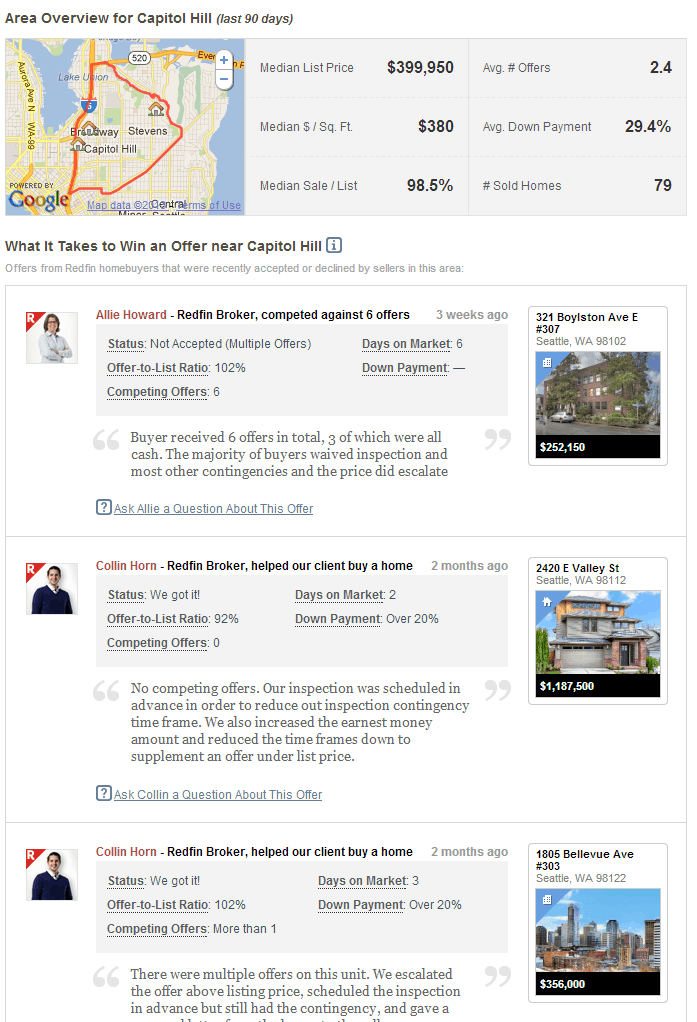Redfin this morning released Offer Insights, real-time statistics and notes from Redfin agents about thousands of offers submitted on behalf of our clients. For every neighborhood we serve, our goal is to give you an intimate view of how every deal went down: whether it was a Northern Virginia home that sold for below the asking price to an all-cash buyer, or a Los Angeles fixer-upper where the buyer paid just a tad over asking price but promised to clear out the seller’s junk and cover the title insurance.
The Offer Insights for some places, like the San Francisco Bay Area, are a horror movie: there was an offer for more than $50,000 over the list price of a Foster City townhouse that was still in the bottom five of 26 total offers. An all-cash offer for more than $150,000 over the asking price of an El Cerrito stunner lost out to a buyer who conducted a pre-inspection to be able to take the property as-is.
But there are also hopeful stories too, of buyers in Acton, Massachusetts who won out over four investors by building a relationship with the seller, or a Redfin client who simply beat everyone else to the punch, acting on an Instant Update to tour a cute little Dallas condo within hours of its debut, and then making an offer on the same day; backup offers poured in, but too late. Other customers made pre-emptive offers, coming in ahead of the offer deadline with a mostly cash offer and an easy close that were tough to top.
Whenever we represent a client on an offer to buy a home, we publish data on whether we won, how many competing offers we faced, how long the property was on the market, how much our buyer offered compared to list price and the rough amount of our buyer’s planned down-payment:

This is stuff you could only get before by working for months with a savvy real estate agent, but is now available to everyone Redfin serves, on a much larger number of sales: in areas where Redfin has plenty of agents such as northeast Seattle, Redfin clients have made an offer on 20% of the homes sold in December.
And more than ever, our customers want to know what it takes to win: in January, 69% of the offers we submitted for our clients faced competition, up from 53% a year ago. In the Bay Area alone, 94% of our offers were competitive.
To keep pace with the market, we get you the information fast. Because we capture all the details about an offer via the tools our agents use to prepare that offer in the first place, we can publish the details within seconds of submitting the offer to a listing agent.
Whoa, This is Sensitive Stuff! What About Confidentiality?
To avoid wrecking a deal still in progress, we identify the home only by its neighborhood before the sale closes; we also leave out the Redfin agent’s notes, and provide broader ranges around the price of our client’s offer and other deal details:

Once the deal is done, we ask our own client if we can identify the home on which that client bid. If the client prefers to keep the entire story confidential, we remove the Offer Insight without ever having identified the property it was about. Otherwise, we identify the property and publish more specific details about the offer.
We publish Offer Insights throughout Redfin.com, showing nearby deals when you look at an individual property but also highlighting juicy details about pending sales as you browse our map of listings:

To see a neighborhood’s entire deal history, you can just visit the page for that neighborhood:

And if you want more detail about an Offer Insight, you only have to ask, via an online form associated with each Insight. The Redfin agent who wrote the offer (in this case, Allie Howard) will respond to your questions, usually via email, typically within a few hours:

Offer Insights are not available in the Atlanta real estate market, the Philadelphia real estate market or the Washington DC real estate market yet because we are still awaiting approval from our data providers.
Our Vision: Why Offer Insights Matter
But Offer Insights is more than just a way to guide Redfin customers on how much to pay for a home. It’s part of a strategy based on our unique identity as a real estate broker and a software company. Unlike a pure online real estate company, Redfin employs our own agents in neighborhoods across 20 major American real estate markets, working with thousands of buyers and sellers every month. This allows us to capture real-time information about every neighborhood from local folks on the ground.
And unlike a traditional brokerage, all of our agents use online tools for writing offers that are connected to the website consumers use to shop for homes for sale. This makes it easy to use the Internet to publish the collective wisdom of thousands of agents. The result is a crushing competitive advantage at the point that really matters for an anxious home-buyer, about what it takes to really win.
In March 2011, we first explored the idea of combining our agents’ neighborhood expertise with the vast data Redfin.com stores in the Internet cloud, when we began publishing Tour Insights, our agents’ candid, in-person accounts of the homes we’ve toured:

Since then, Redfin has become a vast repository of proprietary local knowledge, amassing over 250,000 comments about homes with a noisy road nearby or peek-a-boo views no one had noticed before, covering as many as 39% of the homes for sale in our most popular neighborhoods. We now routinely get calls from other agents asking us to publish a Tour Insight on their new listing because these listings get far more Redfin.com and mobile traffic.
With Offer Insights, we hope to deepen the repository of local knowledge we offer our customers. The Internet has been great at organizing and publishing a jumble of numbers and pictures about homes for sale. But it is only now beginning to tell a story, to capture what really just happened around the corner, to convey not merely the data stored by computers but the wisdom of people who have lived and worked in your neighborhood for decades.
This is why Offer Insights isn’t just a feature, it’s a new way for Redfin — and perhaps other companies that combine technology with real-world products or services — to be: big and small, juicy and dry, national and local, data-driven and personal, computer and human.

 United States
United States Canada
Canada